#langblr coréen
Text
Past tense 과거 시제
You’ll get the rule, examples and practices to do
Polite form:
Verb stem +았/었/였+어요
Very polite:
Verb stem +았/었/였+습니다
Casual:
Verb stem +았/었/였+어
Verb stem : verb - 다
★필요하다: To need
필요하
★내리다 : To get off
내리
★(잠을) 자다 : To sleep
잠을 자
★결혼하다: To get married
렬혼하
★보이다: To be seen, to be visible
보이
★바꾸다 : To change
바꾸
★놀다: To play, to hang out
놀
… 등
~If the verb stem's last vowel is ㅏ or ㅗ : then 았어(요) is used
Examples (예문) :
★만나다 ( to meet)=>만나
만났어요
저는 지난 주말에 친구를 만났어요
I met my friend last weekend
★가다 (to go)=> 가
갔어요
저는 카페에 갔어요
I went to the café
★오다 (to come)=> 오
왔어요
집에 왔어요
I came home
~If the verb stem's last vowel is Not ㅏor ㅗ: then 었어(요) is used
Examples (예문) :
★주다 (to give)=>주
줬어요
아빠가 저한테 선물을 줬어요
My dad gave me a gift/ a present
★마시다 (to drink)=> 마시
마셨어요 (마시+었어=마셨어 )
커피를 마셨어요
I drank coffee
★먹다(to eat) => 먹
먹었어요
딸기 케이크를 먹었어요
I ate strawberry cake
★웃다 (to smile, to laugh ) => 웃
웃었어요
친구가 웃었어요
My friend smiled
★보이다 (to be seen, be visible ) =>보이
보였어요
그 케이드라마에 한국 음식이 맛있게 보였어요
Korean food looked so delicious in that kdrama
~If the verb stem ends with 하 you add 였어요 (하+였어요 =했어요)
To put it simply 하changes to 해
Examples (예문) :
★사랑하다 (to love)=> 사랑하
사랑했어요
저는 너를 사랑했어요
I loved you
★요리하다 (to cook) => 요리하
요리했어요
저는 점심을 요리했어요
I cooked lunch
★공부하다 (to study)=> 공부하
공부했어요
하루종일 한국어를 공부했어요
I studied korean all day
~So how can we turn the past tense to formal?
Verb stem +았/었/였+습니다
Instead of 어요, (Verb stem +았/었/였+어요) we replace it with 습니다
★필요하다: To need
필요했습니다
★내리다 : To get off
내렸습니다
★잠을 자다 : To sleep
잠을 잤습니다
★결혼하다: To get married
렬혼했습니다
★보이다: To be seen, to be visible
보였습니다
★바꾸다 : To change
바꿨습니다
★놀다: To play, to hang out
놀았습니다
Practice (연습) :
★I ate an apple
먹다: To eat
저는 사과를 …..
★Last week I drank water every morning
마시다: To drink
지난 주에 저는 맨날 물을 …..
★I drove a car
운정하다:To drive
저는 차를 …..
★I gave present to my friends
주다:to give
저는 제 친구에게 선물을 …..
★I studied korean
공부하다 :To study
저는 한국어를 ….
★I woke up and then I drank water
일어나다: To get up, to wake up
물을 마시다:To drink water
저는 ….
★I studied math and then slept
수학을 공부하다: To study math
잠을 자다: To sleep
저는….
★I drank milk and I ate fruits
우유 마시다: To drink milk
과일을 먹다:To eat fruits
저는…..
Support me at: https://ko-fi.com/koreanwithhaneul
#korean#korean with haneul#hangul#korean conjugaison#korean conversation#coréen#apprendre#bts army#korean alphabet#korean vocabulary#korean vocab list#korean vocaloid#korean study notes#korean study blog#korean blog#korean language#learn korean#korean learning#korean lesson#korean langblr#korean sentence#korean studies#korean studygram#study korean#studystudystudy#learnkorean#learning korean#language study#studykorean#study space
7 notes
·
View notes
Text
salut !💟
i wanted to start using this account for langblr as well><
tbh i had a studyspo blog a while back when i started uni so i'm not new to tumblr just returning^^ my focus is intermediate level french, beginner korean, and suuuper beginner japanese (i've only just started studying kana ,, ;w;)
mes intérèts sont la musique/mode/l'art visuel coréen et japonais, les jeux vidéo, la nourriture.. :3 j'aime aussi lire des romans et dessiner ! si je fais des erreurs n'hésitez pas à me corriger ..!

j'ai étudié un peu le français à l'école au canada.. ma confiance en parlant et à l'écrit est très bas et je trouve que même si je peux comprendre la plupart des phrases que je lis, j'ai encore beaucoup de difficultés à formuler des phrases moi-même et à exprimer mes idées en français etc. ><;; ma prononciation est aussi très désagréable lol
alors je pense qu'en pratiquant un peu chaque semaine je pourrais renforcer mes compétences petit à petit et comme ça je pourrais améliorer mon niveau de langue.. !
저는 한국말로 말하는것을 때 마다 실수를 많이 해요.. 저는 아직 사전을 항상 쓰고 쓰기과 읽기 너무 어려워요 ><" 한국 영화, 드라마들 안 보고 하지만 저는 드라마에 관심이 있어서 재미있는 드라마 있으면 재발 추천해주세요 !! 그리고 제 말을 어색해서 죄송해요 !! 😖
#learning languages is so awkwardd i'm so embarrassed sjdfdfj🙈🙈 aaa#but ima get better eventually#langblr#french#korean#japanese#ty 4 reading!!#🐰💭
8 notes
·
View notes
Text
자연 nature 🍃

녹지 [綠地] = espace vert
조경 [造景] = aménagement paysager
수변 [水邊] = riverain, (du) bord de l’eau
산책로 [散策路] = promenade, chemin de randonnée, sentier
면적 [面積] = étendue, superficie, surface, aire
습지 [濕地] = terrain humide, marécage
생태 [生態] = écologie, vie organique
경관 [景觀] = paysage, vue, perspective, panorama
• Quelques exemples:
이 곳은 경관이 빼어나게¹ 좋다!
= Cet endroit a une vue magnifique!
¹빼어나다 = exceptionnel
포장을¹ 해서 수변공원에서 먹어도 돼요.
= Vous pouvez aussi l’emballer et le manger au parc riverain.
¹포장 [包裝] = emballage
이 길은 주민들의 산책로로 이용된다¹.
= Ce chemin est utilisé par les habitants locaux comme sentier.
¹이용되다 [利用-] = être utilisé
옛날에는 습지에다 바로 볍씨를¹ 뿌려² 농사를³ 지었다.
= Autrefois, les graines de riz étaient plantées directement sur les zones humides.
¹볍씨 = semence de riz
²뿌리다 = asperger, saupoudrer, semer
³농사 [農事] = agriculture
#endroit#listevocab#vocabulaire#langblr#studyblr#korean langblr#korean studyblr#coréen#korean#langblr coréen#studyblr coréen#vocabulaire coréen#language#korea#corée#한국 연구#한국연구#한국학#한국어#한국어배우기#한국어공부중#한국어를#한국#어휘#hanja#chinese characters#caractères chinois#chinois#chinese#china
188 notes
·
View notes
Text
🌼I'm looking for language learning partners🌼
I'm an awful polyglot wannabe and I'm looking for someone as fond of learning languages as me lol.
🌻Spanish native speaker.
🌻English, C1.
🌻French, Intermediate (a little rusty though lmao).
🌻Korean, Intermediate.
🌻Mandarin, Beginner.
🌻Italian, Beginner.
I'm also interested in other languages such as Catalan, Russian, Japanese & Swedish, but I'm trying to focus in the ones I mentioned first lol.
If you are native speaker of any of these languages and are looking for help/someone to practice with hmu🌸🌸🌸
#langblr#languages#polyglot#korean#english#spanish#chinese#mandarin#language partner#language partners#Korean language#español#French#espagnol#anglais#chinois#argentina#coréen#Corée#studyblr
1 note
·
View note
Text
the prompt for the 30 day langblr challenge today was pet peeves, but I couldn’t really think of any, so here’s a list of countries and nationalities that I’m studying! obviously it would take forever to include EVERY country so this list only includes the countries in the EU, the countries where at least 25% of the population speaks French, and a few extra countries I have friends from or have been to or am otherwise personally interested in. also here’s a map of francophone countries!:
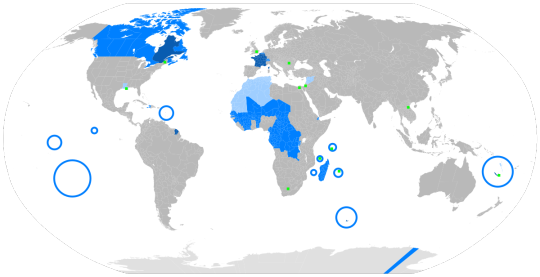
Algeria- l’Algérie (f), algérien
Andorra- l’Andorre (f), andorran
Australia- l’Australie (f), australien
Austria- l’Autriche (f), autrichien
Bangladesh- le Bangladesh, bangladais OR bangladeshi
Belgium- le Belgique, belge
Benin- le Bénin, béninois
Brazil- le Brésil, brésilien
Bulgaria- la Bulgarie, bulgare
Cambodia- le Cambodge, cambodgien
Cameroon- le Cameroun, camerounais
Canada- le Canada, canadien
Central African Republic- la République centrafricaine, centrafricain
Chile- le Chili, chilien
China- la Chine, chinois
Comoros- la Comores (f), comorien
Republic of Congo- le Congo OR la République du Congo, congolais
DR Congo- le Congo OR la République démocratique du Congo, congolais
Croatia- la Croatie, croate
Cyprus- Chypre (f), chypriote
Czech Republic- la République tchèque, tchèque
Denmark- le Danemark, danois
Djibouti- le Djibouti, djiboutien
Equatorial Guinea- la Guinée équatoriale, couldn’t find demonym
Estonia- l’Estonie (f), estonien
Finland- la Finlande, finlandais
France- la France, français
Gabon- le Gabon, gabonais
Germany- l’Allemagne (f), allemand
Greece- la Grèce, grec/grecque
Guinea- la Guinée, guinéen
Haiti- Haïti, haïtien
Hungary- la Hongrie, hongrois
India- l’Inde (f), indien
Ireland- l’Irlande (f), irlandais
Italy- l’Italie (f), italien
Ivory Coast- la Côte d’Ivoire, ivoirien
Japan- le Japon, japonais
Latvia- la Lettonie, letton
Lebanon- le Liban, libanais
Lithuania- la Lituanie, lituanien
Luxembourg- le Luxembourg, luxembourgeois
Mauritius- la Maurice, mauricien
Mexico- le Mexique, mexicain
Monaco- Monaco, monégasque
Morocco- le Maroc, marocain
Netherlands- les Pays-Bas, néerlandais
Poland- la Pologne, polonais
Portugal- le Portugal, portugais
Romania- la Roumanie, roumain
Russia- la Russie, russe
Senegal- le Sénégal, sénégalais
Seychelles- les Seychelles (f), seychellois (i think? couldn’t confirm 100%)
Slovakia- la Slovaquie, slovaque
Slovenia- la Slovénie, slovène
South Korea- la Corée du Sud, coréen
Spain- l’Espagne (f), espagnol
Sweden- la Suède, suédois
Switzerland- la Suisse, suisse
Togo- le Togo, togolais
Tunisia- la Tunisie, tunisien
UK- le Royaume-Uni, britannique
US- les États-Unis (m), américain
Vanuatu- le Vanuatu, couldn’t find demonym
32 notes
·
View notes
Text
Hi ! ( Salut ! )
Hello ! I am looking for more active langblrs to follow ... preferably in korean or French ! I would like to see some more langblr content on my dash. preferably if they have updated in the past 3 months would be cool ...
Bonjour ! Je cherche pour les langblrs actifs à suivre .... je préfère en coréen ou français ! Je voudrais à voir des choses langblrs sur ma dash . C’est bon s’il a mettais à jour il y a 3 mois seraient super ....
#langblr#kopinotes#studyblr#Studying At Night#study blog#student#french#français#frenchblr#korean#kindly send me a message if i translated wrong
2 notes
·
View notes
Text
시작!
Bonjour!
Ceci est mon premier post de studyblr/langblr. J’ai 18 ans et j’étudie le coréen. Je parle français et anglais, et je comprends un peu l’espagnol. Je suivrai de mon blog principal.https://www.tumblr.com/blog/thenebuleuse
Hello!
This is my first post as a studyblr/langblr. I’m 18, and I study Korean. I speak French and English, and I understand a little bit of Spanish. I will follow from my main blog.https://www.tumblr.com/blog/thenebuleuse
C’est parti! 시작! Let’s go!
5 notes
·
View notes
Text
Future tense 미래 시제
You'll get the rule, examples and practices to do
Polite form:
Verb stem + (으) ㄹ 거예요
Very polite:
Verb stem + (으) ㄹ 겁니다
Casual:
Verb stem + (으) ㄹ 거야
Verb stem : verb - 다
★가다: To go 가
★오다: To come 오
★자다: To sleep 자
★사랑하다: to love 사랑하
★만나다: To meet 만나
★보다: To see 보
★읽다: To read 읽
… 등
~If the verb stem ends with a vowel, then ㄹ 거예요 is used
Examples (예문) :
★만나다 ( to meet)=>만나
만날 거예요
저는 주말에 친구를 만날 거예요.
I will meet my friend on the weekend
★가다 (to go)=> 가
갈 거예요
저는 카페에 갈 거예요.
I'm going to the café ( I will go to café)
★오다 (to come)=> 오
올 거예요
집에 올 거예요.
I'm coming home
★주다 (to give)=>주
줄 거예요.
아빠가 저한테 선물을 줄 거예요.
My dad will give me a gift
★마시다 (to drink)=> 마시
마실 거예요
커피를 마실 거예요.
I will drink coffee
★사랑하다 (to love)=> 사랑하
사랑할 거예요.
저는 너를 항상 사랑할 거예요
I will always love you
★요리하다 (to cook) => 요리하
요리할 거예요
저는 점심을 요리할 거예요.
I will cook lunch
★공부하다 (to study)=> 공부하
공부할 거예요
한국어를 공부할 거예요.
I will study korean
~If the verb stem ends with a consonant, then 을 거예요 is used
Examples 예문:
★앉다 (to sit down)=> 앉
앉을 거예요
여기 앉을 거예요.
I'm going to sit here
★먹다(to eat) => 먹
먹을 거예요.
딸기 케이크 먹을 거예요.
I am going to eat strawberry cake
★웃다 (to smile, to laugh ) => 웃
웃을 거예요
항상 웃을 거예요.
I will always smile
★없다 (to not have, to not be at (place) ) => 없
없을 거예요
다음 주에 집에 없을 거예요
I won't be home next week.
~If the verb stem ends with ㄹ then you just add 거예요 to it
Examples (예문):
★놀다 (to play, hang out) =>놀
놀 거예요
제가 친구랑 같이 놀 거예요.
I will hang out with my friends
★살다 (to live)=> 살
살 거예요.
내년에 한국에 살 거예요
Next year I'm going to live in Korea
★팔다 (to sell)=>팔
팔 거예요
제 핸드폰을 팔 거예요.
I am going to sell my phone
★울다 ( to cry) => 울
울 거예요
내가 원하면 울거야
I'll cry if I want to
Practice 연습:
★I will drink some water
to drink: 마시다
나는 물을 ….
★I will work out daily from now on
to work out: 운동하다
이제부터 매일 ….
★I will buy stickers
to buy: 사다
스티커를 ….
★I will give presents to my friends
To give: 주다
친구들에게 선물을 ….
★I will study korean this afternoon
to study: 공부하다
오늘 오후에 한국어를 ……
Support me at: https://ko-fi.com/koreanwithhaneul
#korean#korean with haneul#hangul#coréen#korean conjugaison#korean conversation#apprendre#korean alphabet#korean language#korean learning#korean lesson#korean langblr#korean blog#korean study blog#korean vocabulary#korean vocab list#korean vocaloid#bts army#learnkorean#learning korean#language study#learn korean#study korean#studystudystudy#studykorean#korean sentence#korean studies#korean study notes#study space#south korea
5 notes
·
View notes
Text
Let's talk about hobbies (in korean)! 취미에 대해 말합시다! (loisirs, الهوايات)
How to ask and answers questions about hobbies, Comment poser et répondre aux questions sur les loisirs, كيف تسأل وتجيب على الأسئلة المتعلقة بالهوايات:
❀취미가 뭐예요?
What is your hobby? /What are your hobbies?
Quel est votre passe-temps ? /Quels sont vos loisirs?
ما هي هوايتك؟ / ما هي هواياتك؟
❀뭘 하는 걸 좋아해요?
What do you like to do?
qu'est-ce que tu aimes faire ?
ماذا تحب ان تفعل؟
❀….. 는 걸 좋아해요?
Do you like…. ?
Tu aimes…. ?
هل تحب ….؟
❀재미로 뭘 하는 걸 좋아해요?
What do you like to do for fun/ as a hobby?
Qu'aimez-vous faire pour vous amuser?
ماذا تحب أن تفعل كهواية؟ ماذا تحب أن تفعل كهواية؟
❀시간 남을 때 뭐 해요?
What do you do in your free time?
Que faites-vous pendant votre temps libre?
ماذا تفعل في وقت فراغك؟
❀자유시간 있을 때 뭐하는 걸 좋아해요?
What do you like to do in your free time?
Qu'est-ce que vous aimez faire pendant ton temps libre?
ماذا تحب ان تفعل في وقت فراغك؟
❀스포츠를 할 수 있어요?
Can you do any sports?
Faites-vous du sport?
هل تمارس أي رياضة؟
❀V-는 거 좋아해요?
Do you like… ?
Aimez-vous… ?
هل تحب… ؟
❀V-는 제 취미예요
…… is my hobby
…… est mon passe-temps
…… هي هوايتي
❀제 취미는 N-이에요/예요
My hobby is ……
Mon passe-temps est ……
…… هوايتي هي
❀N-이에요/예요
It's…….
C'est …..
إنه ……
취미 Hobbies :
★reading: 독서
lecture , القراءة
★cooking: 요리, 요리하는 것
cuisine , الطبخ
★watching movies: 영화보기
regarder des films, مشاهدة الافلام
★watching TV: 티비를 보기, 티비 보는 것
regarder la télévision, مشاهدة التلفاز
★watching dramas: 드라마보기
regarder des drames/series, مشاهدة الدراما
★surfing Internet: 인터넷하기
surfer sur Internet, تصفح الإنترنت
★language learning: 언어 베우기
apprentissage des langues, تعلم اللغة
★blogging: 블로깅
bloguer,
★spending time with friends: 친구하고 시간을 보내기
passer du temps avec des amis, قضاء الوقت مع الأصدقاء
★listening to music: 음악듣기, 음막 듣는 것
écouter de la musique, الاستماع إلى الموسيقى
★singing: 노래하기, 노래하는 거
chant, الغناء
★playing the piano: 피아노 치는 것
jouer du piano, العزف على البيانو
★playing the guitar: 기타를 치는 것
jouer de la guitare, العزف على الجيتار
★playing the drums: 드럼 치는 것
jouer de la batterie, العزف على الطبول
★playing violin: 바이올린 치는 것
jouer du violon, العزف على الكمان
★drawing, painting: 그림 그리기, 그림 그리는 것
dessin, peinture, الرسم
★pottery: 도예 하는것
poterie , الفخار
★calligraphy: 서예 하는 것
calligraphie, فن الخط
★sewing: 바느질
couture, الخياطة
★knitting, crochet: 뜨개질
tricoter, crochet, حياكة كروشيه
★photography: 사진 찍기, 사진을 찍는 것
photographie , التصوير الفوتوغرافي
Support me at: https://ko-fi.com/koreanwithhaneul
#korean#korean alphabet#korean with haneul#hangul#coréen#korean vocabulary#korean vocab list#korean vocaloid#korean language#korean lesson#korean learning#korean langblr#korean sentence#korean studies#korean conversation#korean conjugaison#korean study notes#korean study blog#korean blog#bts army#apprendre#study korean#studystudystudy#study space#language study#studykorean#learnkorean#learning korean#learn korean#south korea
5 notes
·
View notes
Text
Days of the week in korean 요일 (and more)
✺Monday: 월요일, Lundi, الاثنين
월:moon, month; lune, mois ; القمر ، الشهر
난 월요일이 싫어.
I don't like Mondays.
أنا أكره يوم الاثنين
انا لا احب الاثنين.
Je n'aime pas les lundis
✺Tuesday: 화요일, Mardi, الثلاثاء
화: fire, anger; feu, rage; نار ، غضب
그 프로젝트는 화요일 에 이미 완료되었습니다.
The project was already finished on Tuesday.
تم الانتهاء من المشروع بالفعل يوم الثلاثاء
Le projet était déjà terminé mardi.
✺Wednesday: 수요일, Mercredi, الأربعاء
수: water, number; eau, numéro; الماء ،عدد
Ali 삼촌이 수요일에 방문할 거예요.
Uncle Ali nwill visit on Wednesday.
العم علي سيزور يوم الأربعاء.
L'oncle Ali viendra mercredi.
✺Thursday: 목요일, Jeudi,
목: wood, neck/throat; bois, nuque/gorge; خشب ، رقبة / حلق
오늘은 목요일입니다.
Today is Thursday.
اليوم هو الخميس.
Aujourd'hui, c'est jeudi.
✺Friday: 금요일, Vendredi, الجمعة
금: gold; or; ذهب
오늘은 무슨 요일이에요?
오늘은 금요일이예요.
What day is it today?
Today is Friday.
ماهو اليوم؟
اليوم الجمعة.
Quel jour sommes-nous aujourd'hui ?
Aujourd'hui, c'est vendredi.
✺Saturday: 토요일 , Samedi, السبت토: soil, terre, تربة
토요일은 많은 사람들에게 있어 여가를 즐기며 휴식하는 날입니다.
Saturday is a day for many people to enjoy themselves and relax.
بالنسبة لكثير من الناس ، يعتبر يوم السبت يومًا للراحة والاسترخاء.
Samedi, c'est un jour de repos pour beaucoup de gens, tout en profitant de leurs loisirs.
✺Sunday: 일요일 , Dimanche, الأحد
일: day, job/work, a matter; jour, travail; يوم: العمل ، مسألة
오늘 일요일인데도 일하러 가야 돼요.
Although it's Sunday today, I have to go to work.
على الرغم من أن اليوم هو الأحد ، يجب أن أذهب إلى العمل.
Même si c'est dimanche, je dois aller travailler.
Other related words (d'autres mots, كلمات أخرى ذات صلة):
★평일: weekday, jour de la semaine, يوم من أيام الأسبوع
★주중: weekdays, jours de la semaine, أيام الأسبوع
★주말: weekend, week-end, عطلة نهاية الأسبوع
★요일: Day of the week, Jour de la semaine, يوم الأسبوع
★주일: weekdays, Jours de la semaine, أيام الأسبوع
So when you add numbers (sino-Korean system) :
*일주일:one week, une semaine, أسبوع
*이주일: 2 weeks, 2 semaines, أسبوعان
*삼주일: 3 weeks, 3 semaines, ثلاثة أسابيع
★지난주: last week, la semaine dernière, الأسبوع الماضي
★지난주말: last weekend, le week-end dernier, نهاية الأسبوع الماضي
*지난 is the verb 지나다: to go by, to pass by,passer, يمر . So it literally means: the week/weekend that went by (Cela signifie donc littéralement : la semaine/le week-end qui s'est écoulé, لذلك فهي تعني حرفيا: الأسبوع / نهاية الأسبوع التي مرت)
★다음주: next week, la semaine prochaine, الأسبوع المقبل
★다음주말: next weekend, le week-end prochain, نهاية الأسبوع المقبل
*다음:next, following, then.., suivant, puis..., التالي ، ثم
Support me at: https://ko-fi.com/koreanwithhaneul
#korean#korean with haneul#hangul#korean language#learn korean#korean alphabet#korean vocabulary#korean vocab list#korean vocaloid#coréen#bts army#apprendre#korean conjugaison#korean conversation#korean learning#korean lesson#korean langblr#korean blog#korean study blog#korean sentence#korean studies#korean study notes#study korean#studystudystudy#study space#language study#studykorean#learnkorean#learning korean#south korea
2 notes
·
View notes
Text

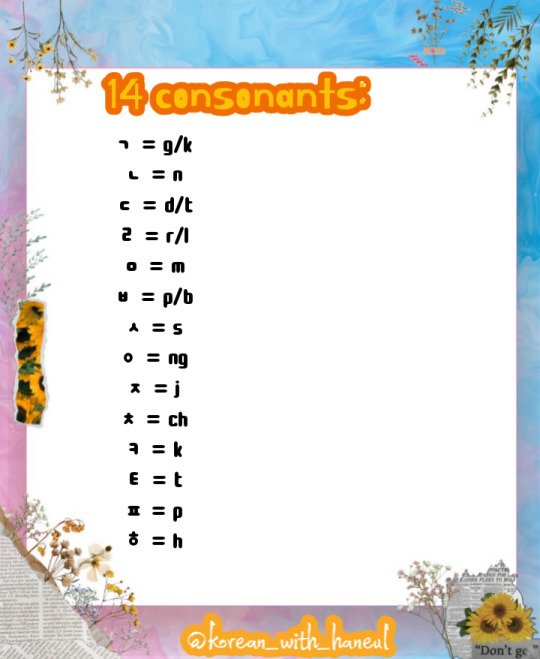
#korean#coréen#learnkorean#studykorean#learn korean#korean language#hangul#language study#korean alphabet#kpop#kdrama#south korea#korea#korean learning#korean lesson#korean study blog#korean langblr#study space#study korean
1 note
·
View note
Text
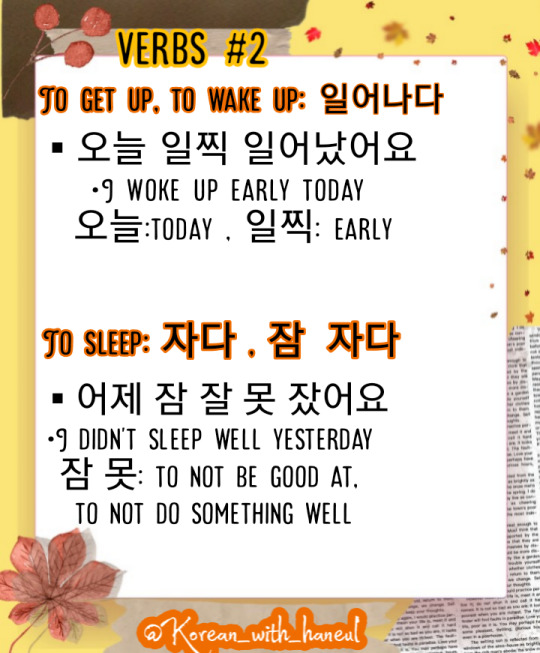

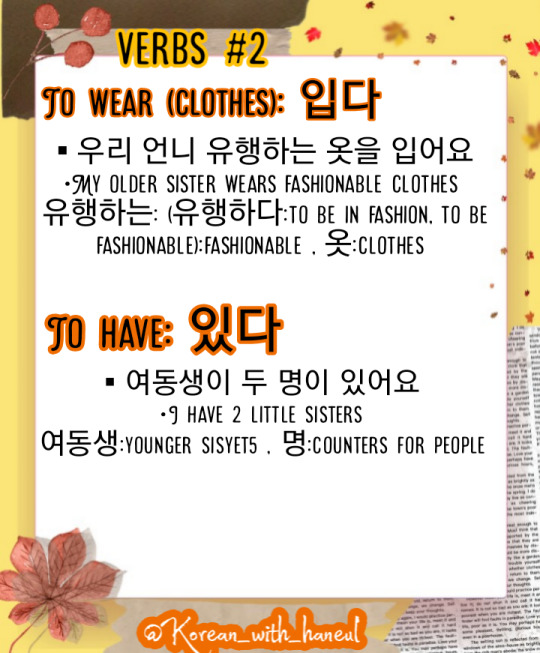

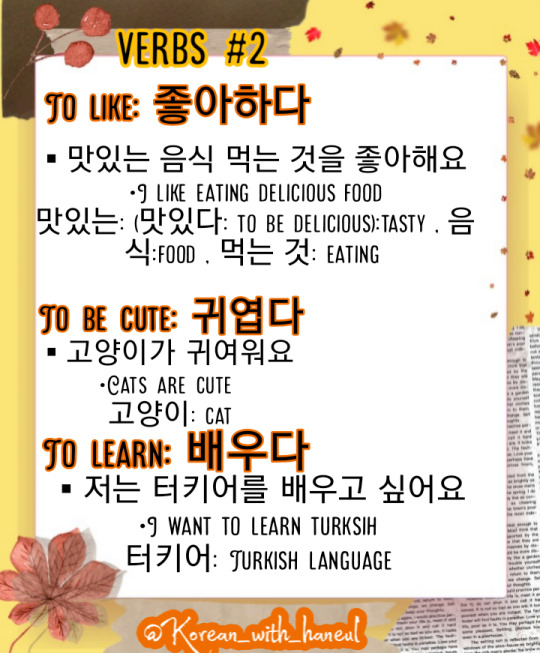

#korean#hangul#korean with haneul#korean alphabet#korean language#korean learning#korean lesson#coréen#korean conversation#korean conjugaison#korean vocaloid#korean vocab list#korean vocabulary#bts army#apprendre#korean sentence#korean studies#korean study blog#korean study notes#korean langblr#learnkorean#learning korean#language study#learn korean#study korean#studystudystudy#study space#south korea#studykorean#korean drama
1 note
·
View note
Text
오늘의 어휘목록 📑

영웅 [英雄] = héros
주르륵 *onomatopée* = son de quelque chose qui coule
자세하다 [仔細/子細-] = détaillé
밑에 = sous {”밑” + la particule “에”}
굽다 = cuire
벌집 = nid d’abeille, ruche, alvéole, guêpier, nid de guêpe
굳히다 = durcir, solidifier, figer
식감 = texture (d’un aliment)
동시 [同時] = en même temps, à la fois, simultanément
번거롭다 = contrariant, ennuyeux, embêtant
가득 = plein, rempli
올리다 = augmenter, élever, hausser
달다 = sucré
입맛 = goût (en matière de nourriture)
조절하다 [調節-] = régler, mettre (quelque chose) au point
사각 = carré (forme)
틀 = moule, forme
자유롭게 [自由-] = librement
원형 [圓形] = cercle, rond (forme)
시청하다 [視聽-] = regarder/écouter (une émission de tv)
#vocabulaire#langblr#studyblr#korean langblr#korean studyblr#coréen#korean#langblr coréen#studyblr coréen#vocabulaire coréen#language#korea#corée#한국 연구#한국연구#한국학#한국어#한국어배우기#한국어공부중#한국어를#한국#어휘
31 notes
·
View notes
Text
오늘의 어휘목록 📑

파생어 [派生語] = mot(s) dérivé(s)
문지르다 = frotter, frictionner
끌리다 = être traîné/tiré
닫히다 = (se) fermer
바닥 = sol
쓸리다 = être balayé/emporté, traîner
멈추다 = cesser, s’arrêter, stopper
운전하다 = conduire *faire marcher une machine, conduire un véhicule
덜다 = enlever, prendre quelque chose dans quelque chose, exclure quelque chose de quelque chose
한시름 = grande inquiétude/gros souci
스르륵 *onomatopée* = une chose effleure légèrement le sol ou un objet
#listevocab#vocabulaire#langblr#studyblr#korean langblr#korean studyblr#coréen#korean#langblr coréen#studyblr coréen#vocabulaire coréen#language#korea#corée#한국 연구#한국연구#한국학#한국어#한국어배우기#한국어공부중#한국어를#한국#어휘#hanja#chinese characters#caractères chinois#chinois#chinese#china#chine
20 notes
·
View notes
Text
NCT 127 - 영웅 [英雄] Kick It
내가 모든 GIF를 만들었어 ~

[Tous]
Yeah, let me introduce you to some
New things (Ayo), new things (Ayy, what), new things (Woo)
Bass kick swingin' like I'm Bruce Lee
Bruce Lee (Ayo), Bruce Lee (You want it?)
Shimmy, shimmy, shimmy
불이 붙네 불이 붙네 (You know that), 이 무대 위로 뜰 땐 (Ha)
난 앞으로 찔러 좌우 Bruce Lee (Ayo)
날아다녀 하루 종일 Bruce Lee
불 ➺ feu
붙다 ➺ se coller
무대 [舞臺] ➺ scène
위 ➺ dessus ; sur
앞으로 ➺ en avant
찌르다 ➺ transpercer ; piquer
좌우 [左右] ➺ gauche et droite
날아다니다 ➺ voler ; voltiger (d’un endroit à un autre)

[Haechan, Jungwoo]
Yeah, yeah (Say what?)
Coming up, 지금 여기로
Baby, 이 느낌은 이해 못 해 머리론
Fighting for all day
아무 생각 말고 너의 이야기대로 걸어
이해 [理解] ➺ compréhension ; connaissance
머리 ➺ tête ; esprit
아무 ➺ n’importe (lequel/laquelle)
걸다 ➺ pendre ; suspendre ; accrocher
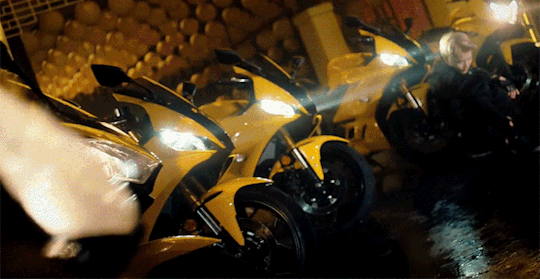
[Taeil, Doyoung]
어두운 어제가 오늘을 삼켜버리기 전에
내 목소린 더 퍼져야 해 소리치면 돼
내겐 no more trauma
삼키다 ➺ avaler ; déglutir ; ingérer
퍼지다 ➺ s’évaser (s'épaissir ou s'élargir progressivement en allant vers l’extrémité)
치다 ➺ frapper ; battre ; battre des mains
내겐 ➺ pour moi *forme contractée de 나에게는

[Yuta, Johnny, Haechan]
Baby, we go wild (Ayy-ayy)
One two seven squad (Ayy-ayy)
난 앞으로 질러 pow
좌우로 내질러 pow
지르다 ➺ crier ; hurler
내지르다 ➺ pousser ; lancer

[Tous]
난 앞으로 찔러 좌우
New thangs (Ayo), new thangs (Ayy, woah), new thangs (Woo)
우리가 어딜 가든 축제
들어 축배 (Ayo) like my birthday (You want it?)
모두 감아 차올리지 높이 (You know that)
Where my roof at? (You know that)
지붕이 우주에 (Ha, na, na, na, na, na, na)
난 앞으로 찔러 좌우 Bruce Lee (Ayo, ha)
날아다녀 하루 종일 Bruce Lee (Say what?)
(Na, na, na, na, na, na)
들다 ➺ porter ; tenir
축배 [祝杯] ➺ toast
감다 ➺ fermer
차올리다 ➺ faire monter avec un coup de pied
높이 ➺ haut ; hauteur ; niveau
지붕 ➺ toit
우주 [宇宙] ➺ univers ; cosmos

[Mark, Taeyong, Johnny, Jaehyun]
Yeah, got that drip, 흘러넘쳐 guts, yeah
잃어버린 겁 어디서든, make it poppin'
Keep it movin' like Jeet Kune
내 앞을 막을 땐
Samuel Jackson 돼, what's up?
배배 꼬인 놈, baby, you just gotta watch
'Enter The Dragon' 난 영화같이
걸음걸이마저 martial arts
Looking that everybody looking at me
Cams, action, movie, shh
쓰러뜨려 하나씩 (쉿)
Blows away 자비는 없지 ruthless
Droppin' the bomb on my enemies
And I'm gonna kick it like Bruce Lee
흘러넘치다 ➺ déborder ; inonder
잃어버리다 ➺ perdre ; égarer
겁 [怯] ➺ crainte ; peur ; timidité
막다 ➺ bloquer ; obstruer
꼬이다 ➺ s’emmêler
걸음걸이 ➺ démarche ; allure
쓰러뜨리다 ➺ abattre ; clouer au lit ; coucher
하나씩 ➺ un par un
자비 [慈悲] ➺ compassion ; clémence ; indulgence ; grâce ; pitié

[Doyoung, Yuta]
수많은 날들의 같은 장면을 반복한 끝에
어제의 날 무너뜨리고 소리치면 돼
내겐 no more trauma
수많다 [數많다] ➺ être innombrable ; abondant ; nombreux
장면 [場面] ➺ scène ; situation
반복하다 [反復하다] ➺ répéter ; réitérer
무너뜨리다 ➺ abattre ; démolir ; détruire

[Haechan, Taeil, Jungwoo]
Baby, we go wild (Ayy-ayy)
One two seven squad (Ayy-ayy)
We ain't not never gonna stop
끝이 안 보여도 가

[Tous]
난 앞으로 찔러 좌우
New thangs (Ayo), new thangs (Ayy, woah), new thangs (Woo)
난 앞으로 찔러 좌우 Bruce Lee
날아다녀 하루 종일 Bruce Lee (Yeah, you want it?)

[Haechan, Doyoung, Jaehyun, Taeil]
My world 만들어가, yeah
상상조차 할 수 없었던
아주 극적인 장면 그 깊은 곳에
눈앞에 펼쳐질 새로운 세상들
손안에 잡힐 듯 내 안으로 들어와
어둠 끝에 다시 난 새로 태어나
상상 [想像] ➺ imagination ; fantaisie ; supposition
극적 [劇的] ➺ dramatique
펼쳐지다 ➺ s’ouvrir ; se déployer ; s’étendre ; s’ouvrir
손안에 ➺ dans (la) main
잡히다 ➺ être attrapé ; se faire attraper ; être arrêté ; se faire prendre
들어오다 ➺ entrer ; pénétrer ; s’introduire
어둠 ➺ obscurité ; ténèbres
태어나다 ➺ naître ; venir au monde

[Break]
Na, na, na, na, na, na, na (Oh-oh)
Na, na, na, na, na, na, na (O-okay)

[Tous]
난 앞으로 찔러 좌우
New thangs, new thangs, new thangs
우리가 어딜 가든 축제
들어 축배 like my birthday
Shimmy, shimmy, shimmy 불이 훅
Shimmy, shimmy, shimmy 훅
높이 where my roof at? 지붕이 우주에 (Na, na, na, na, na, na)
난 앞으로 찔러 좌우 Bruce Lee
날아다녀 하루 종일 Bruce Lee
날아다녀 하루 종일 Bruce Lee
훅 ➺ onomatopée décrivant: le bruit produit en buvant un liquide d'un trait ; le bruit produit en expirant soudainement de l'haleine avec la bouche rétractée ; la manière dont une odeur, le vent, une chaleur, etc., entre brusquement
#vocabulaire#chanson#langblr#studyblr#korean langblr#korean studyblr#coréen#korean#langblr coréen#studyblr coréen#vocabulaire coréen#language#korea#corée#한국 연구#한국연구#한국학#한국어#한국어배우기#한국어공부중#한국어를#한국#어휘#hanja#chinese characters#caractères chinois#chinois#chinese#china#chine
22 notes
·
View notes
Text
~나 마나
= expression pour indiquer cela ne change rien, que l'on fasse ou pas ce qui est précisé
Exemples:
가나 마나 새로 빌릴 책이 없어서 오늘은 안 가도 될 듯해.
= Je ne pense pas que je doive y aller aujourd'hui car je n'ai pas de nouveau livre à emprunter.
그렇게 연습하면 하나 마나 똑같지. 그냥 오지 말라고 해.
= Si tu pratiques comme ça, c'est pareil. Dis-lui simplement de ne pas venir.
그 사람이 선생이나 마나 나에게는 그저 행인에 불과하다.
= Qu’il soit professeur ou non, il n’est qu’un passant pour moi.
딱 봐도 먹으나 마나 맛이 없을 것 같아.
= On dirait que ça ne va pas être bon (au goût)
#grammaire#langblr#studyblr#korean langblr#korean studyblr#studyblr coréen#langblr coréen#coréen#korean#grammaire coréenne#language#korea#corée#한국 연구#한국연구#한국학#한국어#한국어배우기#한국어공부중#한국어를#한국#문법
16 notes
·
View notes